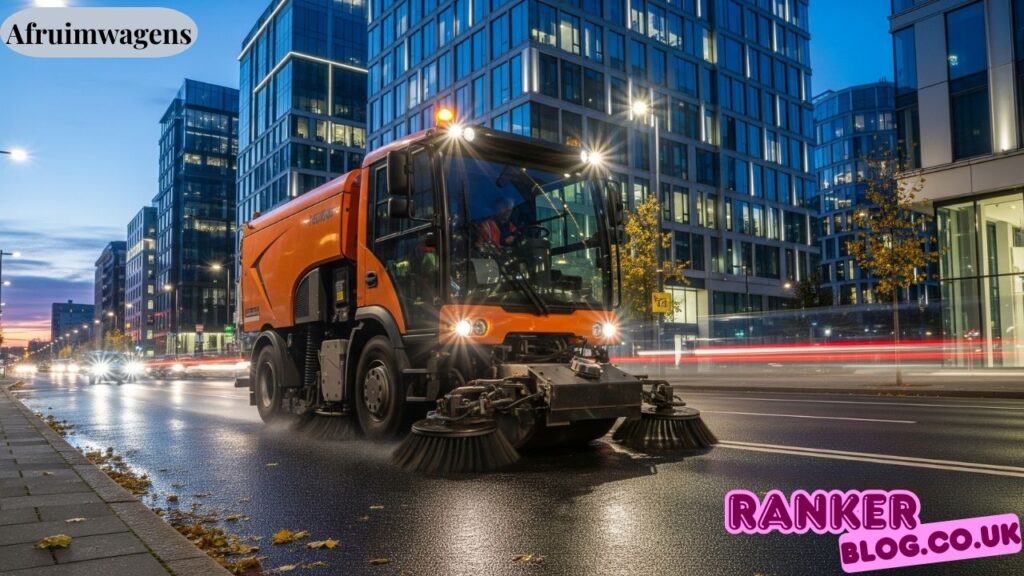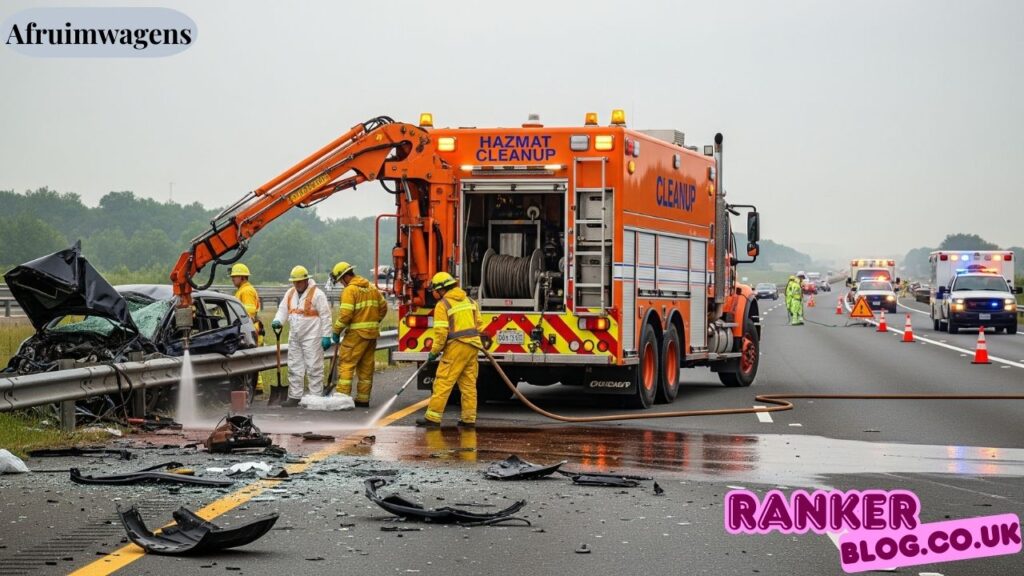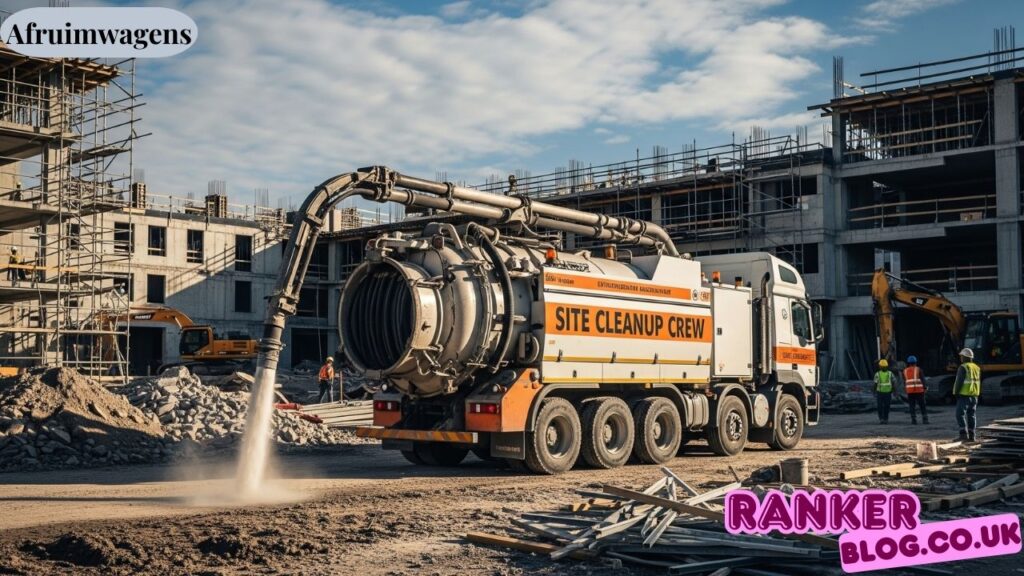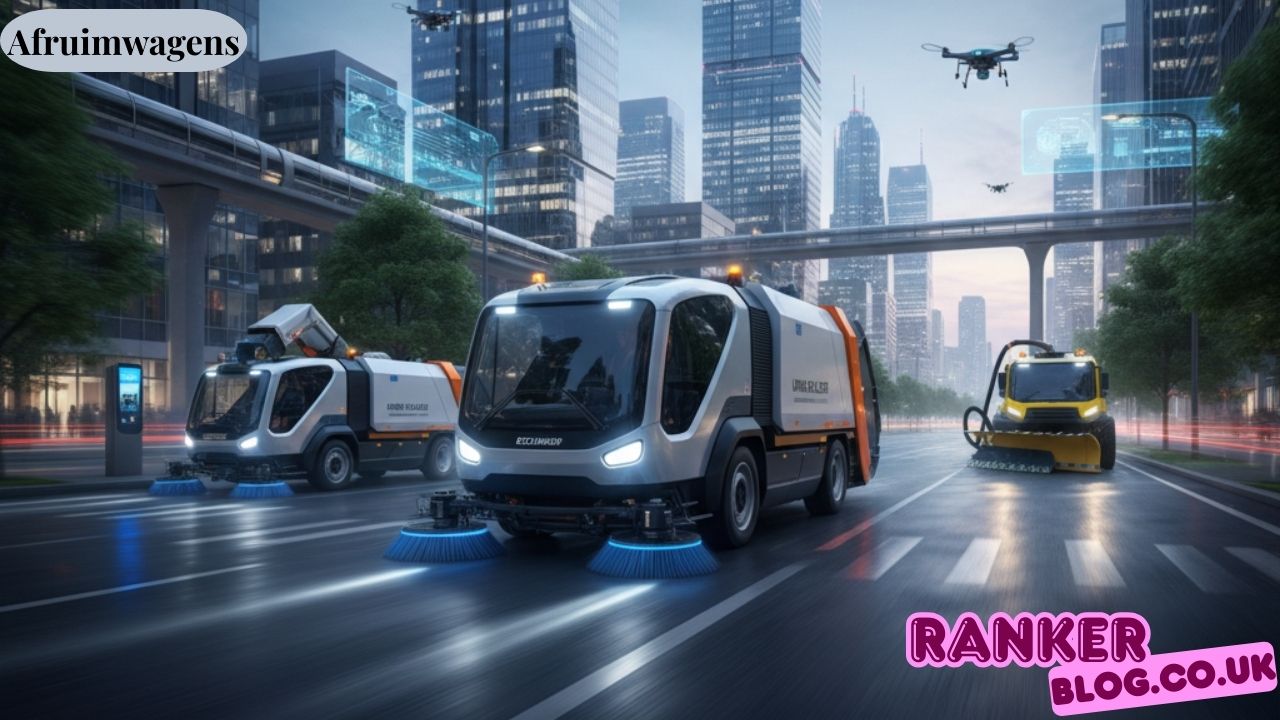Introduction
Afruimwagens represent a critical component of modern urban infrastructure, serving as specialized vehicles designed to maintain cleanliness and order in various environments. These versatile cleanup vehicles play an indispensable role in municipal services, emergency response operations, and industrial maintenance across communities worldwide.
The importance of Afruimwagens extends far beyond simple waste collection. They serve as the backbone of public health initiatives, environmental protection efforts, and urban aesthetics management. From bustling city streets to remote industrial sites, these vehicles ensure that communities remain clean, safe, and functional.
Modern Afruimwagens encompass a diverse range of specialized vehicles, each engineered for specific cleanup tasks and operational requirements. Their applications span multiple sectors, making them invaluable assets for municipalities, private contractors, and emergency response teams.
Types of Afruimwagens

Municipal Cleanup Vehicles
Municipal afruimwagens form the foundation of city maintenance operations. Street sweepers represent the most commonly recognized type, featuring rotating brushes and robust suction systems that remove debris, leaves, and litter from roadways and sidewalks. These vehicles operate on predetermined routes, ensuring consistent cleanliness standards throughout urban areas.
Waste collection vehicles constitute another essential category of municipal afruimwagens. These trucks feature hydraulic lifting mechanisms and large storage compartments, enabling efficient collection and transportation of residential and commercial waste. Their robust design allows them to navigate tight urban spaces while maintaining operational efficiency.
Leaf and debris removal trucks serve seasonal cleanup needs, particularly during autumn months when fallen foliage creates maintenance challenges. These specialized afruimwagens incorporate robust vacuum systems and large-capacity storage areas, allowing crews to quickly clear parks, streets, and public spaces.
Emergency Response Vehicles
Emergency response afruimwagens provide rapid cleanup capabilities during crisis situations. Accident scene cleanup units arrive quickly at traffic incidents, removing debris and hazardous materials to restore normal traffic flow. These vehicles are equipped with specialized equipment for handling various emergency scenarios.
Hazardous material cleanup vehicles represent highly specialized afruimwagens equipped with containment systems, protective equipment, and decontamination capabilities. Their crews receive extensive training in handling dangerous substances, ensuring public safety during chemical spills or environmental incidents.
Storm damage clearing equipment includes heavy-duty afruimwagens capable of removing fallen trees, building debris, and flood-related waste. These vehicles often feature enhanced mobility systems and powerful cutting tools, enabling operations in challenging terrain conditions.
Construction Site Cleanup
Construction industry afruimwagens focus on managing building-related waste and site preparation activities. Demolition debris removal trucks handle heavy materials, such as concrete, steel, and masonry, featuring reinforced storage areas and robust hydraulic systems for efficient loading operations.
Construction waste haulers transport various building materials and debris from active construction sites to disposal facilities. These Afruimwagens maintain strict scheduling to prevent work delays and ensure continuous project progress.
Site preparation vehicles combine cleanup functions with earth-moving capabilities, clearing vegetation, debris, and obstacles before construction begins. Their versatile design makes them valuable assets for development projects of all sizes.
Specialized Cleanup Vehicles
Snow removal equipment represents seasonal afruimwagens designed for winter maintenance operations. These vehicles feature plowing attachments, salt-spreading systems, and enhanced traction capabilities, ensuring safe travel conditions during adverse weather conditions.
Beach cleaning machines serve coastal communities, removing litter, seaweed, and debris from sandy areas. These specialized Afruimwagens incorporate gentle cleaning mechanisms that preserve natural beach environments while maintaining cleanliness standards.
Park and recreational area maintenance vehicles provide landscaping and cleanup services in public parks and recreational areas. These versatile Afruimwagens carry various tools and equipment, enabling crews to maintain trails, picnic areas, and sports facilities effectively.
Key Features and Equipment

Vehicle Specifications
Modern Afruimwagens utilize diverse chassis configurations optimized for specific operational requirements. Compact urban models prioritize maneuverability in tight spaces, while heavy-duty versions emphasize payload capacity and durability for demanding applications.
Engine power and fuel efficiency considerations drive Afruimwagens’ design decisions. Manufacturers are increasingly incorporating hybrid and electric powertrains to reduce their environmental impact while maintaining operational performance standards.
Load capacity and dimensional specifications vary significantly among different afruimwagens types. Municipal street sweepers typically feature moderate capacity with enhanced maneuverability, while construction debris haulers prioritize maximum payload capabilities.
Cleanup Equipment
Hydraulic systems provide the power needed for lifting mechanisms, compaction systems, and accessory operations in modern afruimwagens. These systems enable efficient loading and unloading processes while reducing manual labor requirements for operators.
Suction and vacuum systems represent core technologies in many afruimwagens applications. Powerful fans and filtration systems allow these vehicles to collect acceptable debris, dust, and liquid waste materials effectively.
Brush and sweeping attachments vary according to specific cleaning requirements. Street-sweeping afruimwagens feature rotating brushes designed for different surface types, while specialized models incorporate pressure washing systems for deep cleaning applications.
Storage compartments and containers maximize operational efficiency by organizing tools, supplies, and collected waste materials. Modern afruimwagens incorporate modular storage solutions that adapt to changing operational needs.
Safety Features
Warning lights and signage ensure afruimwagens remain visible during operations, particularly when working in traffic areas or during nighttime activities. LED lighting systems provide enhanced visibility while reducing power consumption.
Backup alarms and camera systems protect operators and bystanders during vehicle maneuvering. Advanced Afruimwagens incorporate multiple camera angles and proximity sensors for comprehensive situational awareness.
Protective equipment for operators includes enclosed cabs with filtration systems, ergonomic controls, and safety restraint systems. These features ensure operator comfort and safety during extended work periods.
Operations and Applications

Urban Environment
Street cleaning and maintenance operations represent primary applications for urban afruimwagens. These vehicles follow scheduled routes, maintaining consistent cleanliness standards while adapting to seasonal requirements and special events.
Event cleanup operations require rapid deployment of afruimwagens to restore normal conditions after festivals, parades, and public gatherings. Coordinated teams work efficiently to minimize disruption to regular city activities.
Regular municipal services depend on reliable afruimwagens to maintain public spaces, collect waste, and respond to citizen requests for cleanup assistance. These routine operations form the foundation of community livability standards.
Highway and Road Maintenance
Accident cleanup procedures utilize specialized afruimwagens equipped for rapid response and debris removal. These operations prioritize safety while quickly restoring normal traffic flow on major transportation corridors.
Routine road debris removal involves scheduled operations with specialized vehicles along highways and arterial roads. These activities prevent hazardous conditions and maintain infrastructure integrity through consistent maintenance efforts.
Weather-related clearing operations deploy Afruimwagens during storms, floods, and other natural events. Emergency response protocols ensure the rapid deployment to critical areas that require immediate attention.
Industrial Applications
Factory and warehouse cleanup relies on specialized afruimwagens designed for indoor and outdoor industrial environments. These vehicles handle various waste streams while meeting strict safety and environmental regulations.
Port and terminal operations utilize heavy-duty afruimwagens capable of managing large-scale cleanup activities. These applications require vehicles with enhanced durability and specialized equipment configurations.
Airport ground maintenance employs afruimwagens for runway cleaning, debris removal, and emergency response capabilities. Strict operational standards ensure aviation safety while maintaining facility cleanliness and hygiene.
Technology and Innovation
Modern Advancements
GPS tracking and route optimization technologies enable Afruimwagens operators to maximize efficiency while reducing fuel consumption and operational costs. Real-time monitoring systems provide valuable operational data for fleet management decisions.
Automated systems and robotics increasingly supplement traditional afruimwagens operations. These technologies reduce labor requirements while improving consistency and safety in cleanup activities.
Environmental monitoring capabilities allow modern afruimwagens to detect air quality issues, hazardous materials, and other ecological concerns during routine operations. This data supports broader environmental protection efforts.
Eco-Friendly Solutions
Electric and hybrid powertrains represent significant advancements in afruimwagens technology. These systems reduce emissions and noise pollution while maintaining operational performance standards required for effective cleanup operations.
Water recycling systems incorporated into modern afruimwagens minimize environmental impact during cleaning operations. Closed-loop systems filter and reuse water, reducing consumption and waste generation.
Emission reduction technologies help afruimwagens meet increasingly strict environmental regulations. Advanced engine management systems and exhaust treatment technologies minimize pollutant output during operations.
Smart City Integration
IoT connectivity enables afruimwagens to participate in broader innovative city initiatives. Connected vehicles provide real-time operational data that supports citywide efficiency improvements and resource optimization.
Predictive maintenance systems monitor afruimwagens performance and predict service needs before failures occur. This proactive approach reduces downtime and maintenance costs while improving operational reliability.
Real-time monitoring and reporting capabilities allow fleet managers to track afruimwagens performance, fuel consumption, and maintenance requirements. This data supports informed decision-making and operational optimization.
Operational Considerations
Crew Requirements
Operator training and certification programs ensure that Afruimwagens crews possess the necessary skills and knowledge for safe, effective operations. Comprehensive training covers vehicle operation, safety procedures, and maintenance requirements.
Safety protocols and procedures govern all Afruimwagens operations, protecting crew members and the public from potential hazards. Regular safety training updates address evolving risks and regulatory requirements.
Team coordination and communication systems enable efficient afruimwagens deployment across multiple work sites. Advanced communication technologies support real-time coordination between crews and management personnel.
Maintenance and Upkeep
Regular maintenance schedules keep Afruimwagens operating at peak efficiency while preventing costly breakdowns. Preventive maintenance programs address routine service needs and identify potential issues early.
Parts availability and service support ensure minimal downtime for Afruimwagens’ fleets. Strategic partnerships with equipment suppliers and service providers maintain operational continuity.
Cost management and budgeting considerations guide Afruimwagens’ acquisition and operation decisions. Lifecycle cost analysis enables organizations to optimize their fleet composition and replacement schedules.
Regulatory Compliance
Safety standards and regulations govern Afruimwagens’ design, operation, and maintenance requirements. Compliance ensures operator safety and protects organizations from liability issues.
Environmental compliance requirements influence Afruimwagens’ technology choices and operational procedures. Regulations continue evolving to address environmental protection and sustainability goals.
Municipal contracting requirements establish performance standards and operational parameters for freight services. Precise specifications ensure service providers meet community expectations and regulatory obligations.
Economic Impact
Cost-Benefit Analysis
Initial investment considerations for Afruimwagens must balance purchase price against long-term operational savings. Advanced technologies often require higher upfront costs but provide greater efficiency and lower operating expenses over time.
Efficiency improvements and return on investment calculations demonstrate the value proposition of modern Afruimwagens. Quantifiable benefits include reduced labor costs, improved productivity, and enhanced service quality.
Comparison with manual cleanup methods reveals significant advantages for mechanized afruimwagens operations. These vehicles accomplish more work in less time while reducing physical demands on operators.
Market Considerations
Rental versus purchase decisions depend on operational requirements, budget constraints, and utilization patterns. Some organizations benefit from the flexibility of equipment rental, while others achieve savings through direct ownership.
Fleet management strategies optimize the deployment of vehicles across multiple locations and applications. Centralized management systems coordinate vehicle assignments and maintenance schedules for maximum efficiency.
Seasonal demand variations influence afruimwagens acquisition and deployment strategies. Organizations must balance year-round capabilities with peak demand requirements for cost-effective operations.
Future Trends
Emerging Technologies
Autonomous cleanup vehicles represent the next generation of afruimwagens technology. Self-driving capabilities promise improved efficiency and reduced labor costs while maintaining high service quality standards.
Advanced sensor systems enhance Afruimwagens’ operational capabilities through improved environmental awareness and obstacle detection. These technologies support both autonomous operations and operator assistance functions.
Artificial intelligence-powered route optimization maximizes vehicle efficiency by analyzing traffic patterns, weather conditions, and service requirements. Machine learning algorithms continuously improve operational performance.
Sustainability Focus
Carbon footprint reduction initiatives drive automakers toward cleaner technologies and more efficient operational practices. Environmental stewardship is becoming increasingly crucial for both public and private organizations.
Circular economy principles influence Afruimwagens’ design and operation strategies. Manufacturers emphasize the use of recyclable materials, component reuse, and sustainable manufacturing processes.
Green technology adoption accelerates as environmental regulations strengthen and public awareness increases. Organizations prioritize sustainable afrikaner solutions that demonstrate environmental responsibility.
Conclusion
Afruimwagens continue evolving to meet changing community needs and environmental requirements. These essential vehicles provide critical services that maintain public health, safety, and quality of life standards across diverse applications.
The future outlook for Afruimwagens includes continued technological advancements, improvements in environmental sustainability, and enhanced operational efficiency. Organizations investing in modern cleanup vehicle technologies position themselves for long-term success.
Stakeholders should carefully evaluate their specific requirements when selecting afruimwagens solutions. Consideration of operational needs, budget constraints, environmental goals, and technological capabilities ensures optimal investment decisions that support effective cleanup operations for years to come.
Also Read: Ford Recalls Hundreds of Thousands of Maverick Pickup Trucks. – Safety Alert

